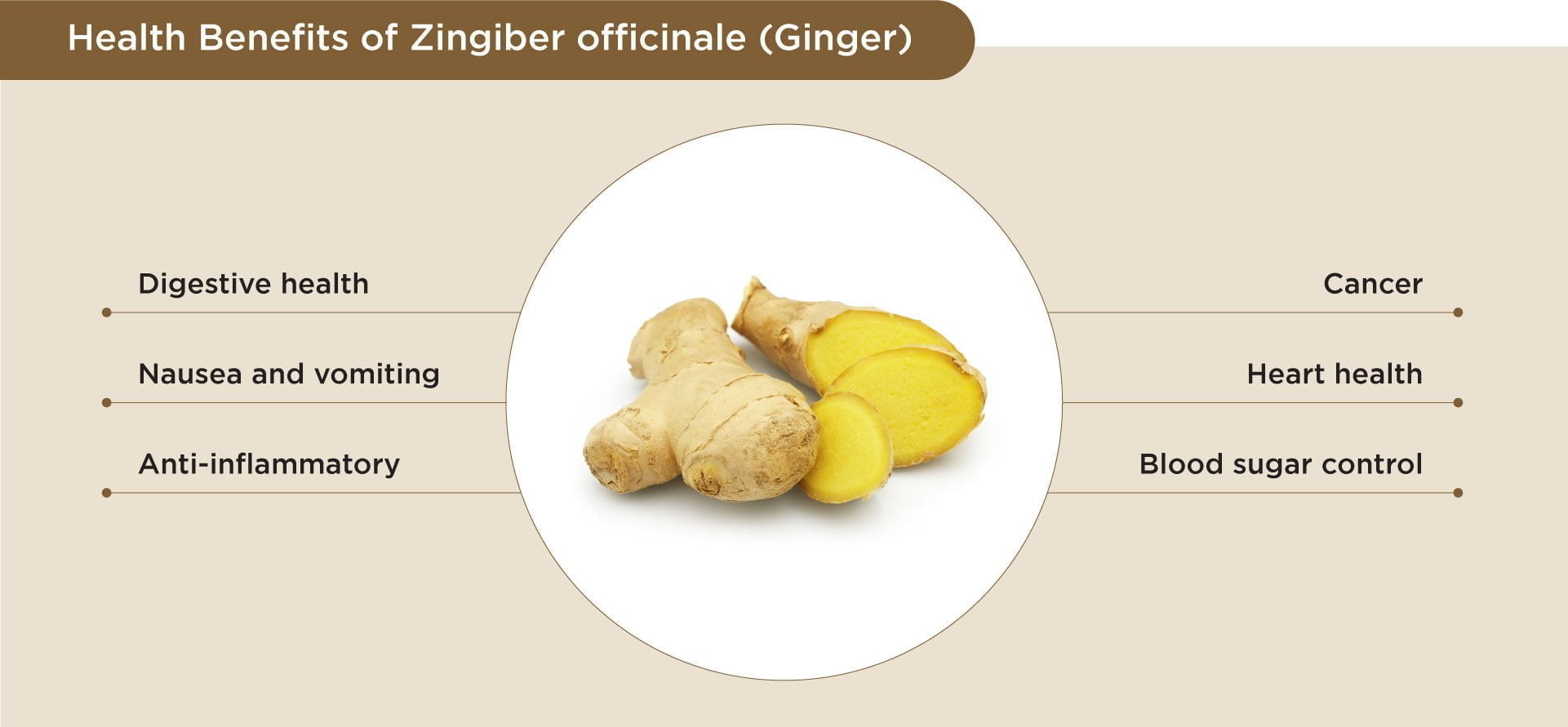Zingiber officinale (Ginger)

Zingiber officinale (Ginger)
Zingiber officinale, also commonly known as ginger, is a rhizomatous perennial herb from the Zingiberaceae family 1. Ginger is an important kitchen spice that provides a sweet peppery flavour with strong spicy aroma. It is used in various forms, including fresh, dried, pickled, preserved, crystallized, powdered, or ground. Zingiber officinale has a long history of use in Chinese and Ayurvedic medicine. Traditionally, Zingiber officinale has been used in treating numerous ailments such as arthritis, stroke, paralysis, toothache, menstrual pain, fever, stomach colds and vomiting 1,2.
Nutritional Facts
The rhizome of Zingiber officinale possesses a good amount of carbohydrate, minerals, and vitamins3. Zingiber officinale rhizome is a rich source of minerals including iron, magnesium, calcium, potassium, phosphorus and zinc 2,3. It also contains vitamins such as thiamine, riboflavin, niacin, and vitamin C 3. The bioactive compounds that contribute to the medicinal benefits are gingerol, shogaol, zingerone and paradol 1,2,3. These components do not easily vaporize and are responsible for the “burning” effect, felt in the mouth.
Published Health Benefits
1. Digestive Health
Zingiber officinale has been effective in stimulating digestion and relieves constipation and flatulence by speeding up the emptying of stomach 3. Ginger extract has also been reported to have gastric ulcer-preventive potential by increasing mucus secretion 1.
2. Nausea and Vomiting
Zingiber officinale appears to be effective against nausea and vomiting. Ginger may help to relieve some postoperative nausea and vomiting, Ginger also appears to be effective in reducing symptoms of nausea in pregnant women who suffer morning sickness 1,4.
3. Anti-inflammatory
Zingiber officinale is effective against inflammation, osteoarthritis, and rheumatism 1,3,4. It reduces inflammation, swelling and pain in those suffering from rheumatoid arthritis, osteoarthritis or general muscular discomfort when using Zingiber officinale as a dietary supplement for 3 months to 2 years 4.
4. Cancer
The anticancer properties of Zingiber officinale are attributed to the bioactive compounds [6]-gingerol and zerumbone 2,4. Zingiber officinale has been shown to be effective in suppressing cancer growth in a variety of cancer types, including lymphoma, hepatoma, colorectal cancer, breast cancer, skin cancer, liver cancer and bladder cancer 4.
5. Heart Health
Zingiber officinale plays an important role in protecting the heart. It can improve blood circulation throughout the body by stimulating the heart muscle and diluting the blood, thereby reducing the cardiac workload 3. Antiplatelet properties of ginger also lower the risk of having blood clots 1,3,4. It also reduced LDL cholesterol, triglycerides, and total cholesterol 3,4.
6. Blood Sugar Control
Zingiber officinale has antidiabetic effects. Bioactive compounds [6]-gingerol enhance insulin sensitivity and improve glucose uptake, thereby helping to regulate blood sugar levels in diabetes 4.
References:
1. Bhandari, R., & Sethiya, J. P. (2018). A pharmacological investigation of Zingiber officinale. International Journal of Research and Review, 5(10), 465-469. https://www.ijrrjournal.com/IJRR_Vol.5_Issue.10_Oct2018/IJRR0057.pdf
2. Liu, Y., Liu, J., & Zhang, Y. (2019). Research progress on chemical constituents of Zingiber officinale roscoe. BioMed Research International, 1-21. doi:10.1155/2019/5370823.
3. Zadeh, J. B., & Kor, N. M. (n.d.). Physiological and pharmaceutical effects of Ginger (Zingiber officinale roscoe) as a valuable medicinal plant. Retrieved May 7, 2021, from https://www.imedpub.com/articles/physiological-and-pharmaceutical-effects-of-ginger-zingiber-officinale-roscoeas-a-valuable-medicinal-plant.pdf
4. Bode, A. M., & Dong, Z. (2011). The Amazing and Mighty Ginger. In I. Benzie (Eds.) et. al., Herbal Medicine: Biomolecular and Clinical Aspects. (2nd ed.). CRC Press/Taylor & Francis. https://pubmed.ncbi.nlm.nih.gov/22593941/


